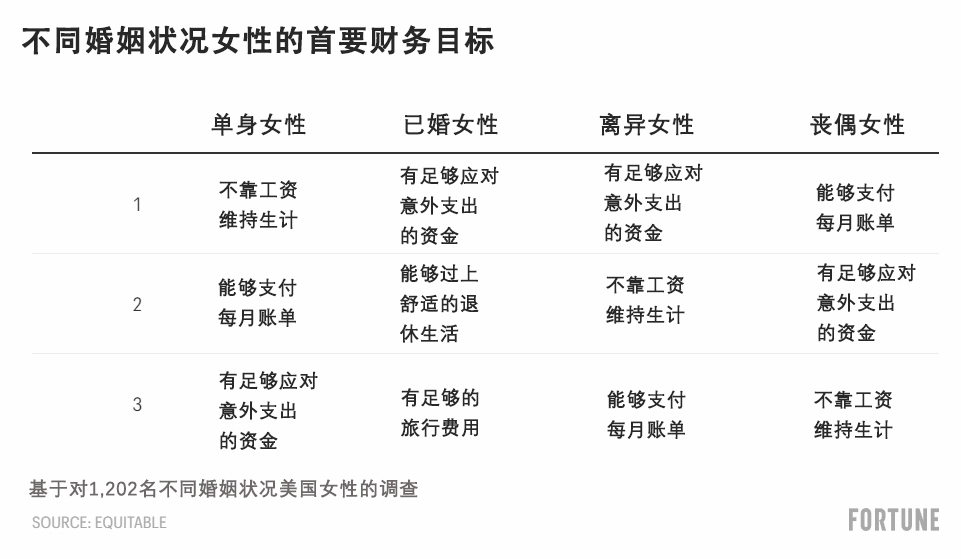
有许多积极的信号表明,美国女性的财务状况有显著改善,投资和收入增加,开始退休储蓄的年龄也早于前辈。但一份最新报告发现,女性对财务管理的信心依旧低于男性,而且她们的信心高度依赖于婚姻状况。
理财服务公司Equitable对美国1,200多名18至77岁的女性和500名男性展开了调查,以研究婚姻状况会对女性与个人财务的关系,以及她们的个人理财方式,产生哪些影响。
调查发现,无论处于年龄段、收入水平或资产水平,女性对个人财务管理能力和实现长期目标的信心,总体上均低于男性。与男性相比,有更大比例的女性表示,她们每天至少会有一次主动担心财务问题,而且女性也更有可能对自己的财务状况感到压力。
这种观点并不新鲜。但Equitable还发现,女性对财务的信心明显会随着婚姻状况的变化而变化:42%的已婚女性表示对实现财务目标的能力有信心,而单身女性的比例为37%,离异女性为35%,丧偶女性为29%。
事实上,与单身、离异或丧偶的女性相比,已婚女性(在Equitable的调查中,包括处于长期伴侣关系的女性)表示,她们更有能力专注于长期财务目标,如退休等。只有已婚女性将舒适的退休生活和旅行等长期目标,作为前三大财务目标。

有多个原因导致这种结果的出现。但其中一个重要的原因是,在当前的经济环境下,与潜在的双收入家庭的人相比,无论男女,单身者的生活都更加艰难。
离异和丧偶女性可能以前不需要工作,或者要在家照顾孩子,这限制了她们的收入能力。而且在异性恋关系中,她们普遍不太可能参与长期财务策略,这让她们对未来缺乏信心。约一半(46%)离异女性和61%的丧偶女性,因为婚姻状况的变化,感觉不太可能实现自己的财务目标。
当然,也有一些例外。有些女性在单身状态下的财务状况更好,而且许多女性很享受自己的财务自由。单身女性对财务的信心低于男性,这并不意味着她们管理财务的能力更差。事实上,研究发现,女性的财务管理能力胜过男性投资者。
更早参与财务管理
虽然已婚女性对财务的信心最高,但Equitable表示,情况可能很快发生变化。例如,丧偶和离异女性的信心低于从未有过伴侣的单身女性。
为什么?因为许多离异和丧偶女性在伴侣关系中,会放弃从整体上管理她们的财务状况。虽然大多数女性会积极参与预算制定等日常活动,但超过一半女性表示,后悔在结婚后没有更多参与财务管理,尤其是在投资和退休规划方面。
Equitable首席营销官康妮·韦弗对此深有体会。韦弗表示,尽管她现在“更精通财务管理”,但丈夫去世后,她感觉自己很脆弱,而且处在一种尴尬的境地,因为她对自己的财务状况知之甚少。再婚之后,她不打算放弃这方面的主导权。
韦弗说道:“虽然我在财务方面见多识广,但还是有许多我不了解的情况。我当时不得不面对非常可怕的状况。令我羞愧的是,我一直没有积极参与我的财务管理。”
事实上,调查发现,生活中的重大变故,如换工作、加薪、离婚和丧偶等,通常会促使女性更积极地参与自己的财务管理。但韦弗和Equitable Advisors的认证理财规划师乔迪·德阿古斯蒂尼鼓励所有人更主动地管理自己的财务。这两位女性鼓励其他女性不要把财务规划权交给伴侣或配偶,或者期待对方制定长期计划。
Equitable的报告用很大的篇幅鼓励女性更早参与财务管理,并向专业顾问寻求帮助。但德阿古斯蒂尼表示,不要随随便便找理财顾问。如果你有任何不明白的问题,不必害怕让对方进一步说明。如果理财顾问不准备帮助你,或者不愿意根据你的情况提供建议,那就换新的顾问。
韦弗表示:“我看到的统计数据显示,年轻人更关心财务状况,这令我备受鼓舞。我们越早让人们学会财务管理方面的基础知识,就能让她们有更好的财务状况。”(财富中文网)
翻译:刘进龙
审校:汪皓
有许多积极的信号表明,美国女性的财务状况有显著改善,投资和收入增加,开始退休储蓄的年龄也早于前辈。但一份最新报告发现,女性对财务管理的信心依旧低于男性,而且她们的信心高度依赖于婚姻状况。
理财服务公司Equitable对美国1,200多名18至77岁的女性和500名男性展开了调查,以研究婚姻状况会对女性与个人财务的关系,以及她们的个人理财方式,产生哪些影响。
调查发现,无论处于年龄段、收入水平或资产水平,女性对个人财务管理能力和实现长期目标的信心,总体上均低于男性。与男性相比,有更大比例的女性表示,她们每天至少会有一次主动担心财务问题,而且女性也更有可能对自己的财务状况感到压力。
这种观点并不新鲜。但Equitable还发现,女性对财务的信心明显会随着婚姻状况的变化而变化:42%的已婚女性表示对实现财务目标的能力有信心,而单身女性的比例为37%,离异女性为35%,丧偶女性为29%。
事实上,与单身、离异或丧偶的女性相比,已婚女性(在Equitable的调查中,包括处于长期伴侣关系的女性)表示,她们更有能力专注于长期财务目标,如退休等。只有已婚女性将舒适的退休生活和旅行等长期目标,作为前三大财务目标。
有多个原因导致这种结果的出现。但其中一个重要的原因是,在当前的经济环境下,与潜在的双收入家庭的人相比,无论男女,单身者的生活都更加艰难。
离异和丧偶女性可能以前不需要工作,或者要在家照顾孩子,这限制了她们的收入能力。而且在异性恋关系中,她们普遍不太可能参与长期财务策略,这让她们对未来缺乏信心。约一半(46%)离异女性和61%的丧偶女性,因为婚姻状况的变化,感觉不太可能实现自己的财务目标。
当然,也有一些例外。有些女性在单身状态下的财务状况更好,而且许多女性很享受自己的财务自由。单身女性对财务的信心低于男性,这并不意味着她们管理财务的能力更差。事实上,研究发现,女性的财务管理能力胜过男性投资者。
更早参与财务管理
虽然已婚女性对财务的信心最高,但Equitable表示,情况可能很快发生变化。例如,丧偶和离异女性的信心低于从未有过伴侣的单身女性。
为什么?因为许多离异和丧偶女性在伴侣关系中,会放弃从整体上管理她们的财务状况。虽然大多数女性会积极参与预算制定等日常活动,但超过一半女性表示,后悔在结婚后没有更多参与财务管理,尤其是在投资和退休规划方面。
Equitable首席营销官康妮·韦弗对此深有体会。韦弗表示,尽管她现在“更精通财务管理”,但丈夫去世后,她感觉自己很脆弱,而且处在一种尴尬的境地,因为她对自己的财务状况知之甚少。再婚之后,她不打算放弃这方面的主导权。
韦弗说道:“虽然我在财务方面见多识广,但还是有许多我不了解的情况。我当时不得不面对非常可怕的状况。令我羞愧的是,我一直没有积极参与我的财务管理。”
事实上,调查发现,生活中的重大变故,如换工作、加薪、离婚和丧偶等,通常会促使女性更积极地参与自己的财务管理。但韦弗和Equitable Advisors的认证理财规划师乔迪·德阿古斯蒂尼鼓励所有人更主动地管理自己的财务。这两位女性鼓励其他女性不要把财务规划权交给伴侣或配偶,或者期待对方制定长期计划。
Equitable的报告用很大的篇幅鼓励女性更早参与财务管理,并向专业顾问寻求帮助。但德阿古斯蒂尼表示,不要随随便便找理财顾问。如果你有任何不明白的问题,不必害怕让对方进一步说明。如果理财顾问不准备帮助你,或者不愿意根据你的情况提供建议,那就换新的顾问。
韦弗表示:“我看到的统计数据显示,年轻人更关心财务状况,这令我备受鼓舞。我们越早让人们学会财务管理方面的基础知识,就能让她们有更好的财务状况。”(财富中文网)
翻译:刘进龙
审校:汪皓
Women in the U.S. have been making strides when it comes to finances, investing and earning more, and saving for retirement earlier than older generations, among other promising behaviors. Still, their confidence in money management lags men—and is highly dependent on their relationship status, a new report finds.
The survey, from financial services company Equitable, of over 1,200 U.S. women aged 18 to 77 and 500 men explores how personal relationship status can change women’s relationship with and management of her finances.
Overall, the survey found that women are less confident in their ability to manage their finances and reach their long-term goals than men are, regardless of age, income, or asset level. A greater share of women say they actively worry about money at least once a day compared to men, and women are also much more likely to feel stressed about their finances.
That’s not new insight. But Equitable also finds that that confidence changes dramatically based on a woman’s relationship status: 42% of married women report believing in their ability to reach their financial goals, compared to 37% of singles, 35% of divorced women, and 29% of widows.
In fact, married women (in Equitable’s survey, this included women in a long-term partnership) report being better able to focus on long-term financial goals, like retirement, than single, divorced, or widowed women. They are the only group to name long-term goals like a comfortable retirement and travel among their top three financial goals.
There are any number of reasons for this. But a big one is that it's generally harder to be a single person in today's economy, no matter your gender, than it is with a potential dual income.
And divorcées and widows may not have needed to work, or stayed home with children, limiting their earning power. They also were less likely, generally, to be involved with long-term financial strategy in heterosexual relationships, leaving them unsure of their futures. Almost half (46%) of divorced women and 61% of widows feel less likely to achieve their financial goals because of the change in their relationship status.
Of course, there are exceptions. Some women are better off financially when they are unpartnered, and many women revel in their financial freedom. And just because single women may report lower confidence than men, that doesn't mean they are actually worse at managing their finances. In fact, research has found that women outperform male investors.
Get involved sooner
While married women report the most confidence, Equitable notes that the circumstances can quickly change. Widowed and divorced women, for example, report much lower confidence than never-partnered single women.
One reason? Many divorced and widowed women took a step back from managing the larger picture when they were in partnerships. While most women are intimately involved in day-to-day activities like budgeting, more than half say they regret not being more involved in their finances during their marriages, especially when it comes to investing and retirement planning.
Connie Weaver, Equitable’s chief marketing officer, knows the feeling well. After her husband died, Weaver was left feeling vulnerable and embarrassed with her knowledge of her finances, despite "knowing better," she says. Now engaged to be married again, she doesn't plan to take the back seat again.
"I’m very financially sophisticated, but yet there was so much I didn’t know. What I was thrown into and what I had to cope with was pretty daunting," Weaver says. "Shame on me, I had not been as engaged as I should have been."
In fact, major life changes—including job switches, raises, divorce, and, yes, the death of the spouse—often serve as catalysts for women to get more involved in their finances, the report finds. But Weaver and Jody D’Agostini, a certified financial planner who works with Equitable Advisors, encourage everyone to be more proactive. The women encourage other women not to delegate planning to their partner or spouse, or wait to build a long-term plan.
Much of Equitable's report focuses on encouraging women to get involved sooner and seek out professional help from an advisor. But don't settle for just any advisor, says D'Agostini. If you don't understand something, don't be afraid to ask for more clarification. If the advisor isn't prepared to help you or won't meet you where you are, find a new one.
"I’m encouraged when I see statistics where young people are paying more attention," says Weaver. "The earlier we can get people to learn the basics, the better of they will be."






